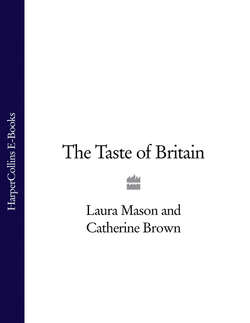Читать книгу The Taste of Britain - Hugh Fearnley-Whittingstall - Страница 136
HISTORY:
ОглавлениеThe dialect name ‘fuggan’ is the one for which the earliest references have been found. It is given in Joseph Wright (1896-1905) attached to quotations dating from the mid-nineteenth century. At this time the word could indicate 3 or 4 different things. Sources agree that these were all based on a heavy pastry: one definition specifies ‘a cake made of flour and raisins, often eaten by miners for dinner’, which sounds very similar to the modern heavy cake. Alternative versions include cakes with either potatoes in the dough or a slice of pork pressed into the top of the pastry before baking, in which case the dish might also be known as a ‘hoggan’.
Nowadays, heavy cake or fuggan seems to refer more to a pastry-like cake containing dried fruit. Recipes vary: one by Dorothy Hartley calls for flour, a little salt and currants, mixed to a paste with clotted cream, rolled out to 20mm thick; another contains flour, sugar, currants and lard; a third is like puff pastry, made with equal quantities of butter and flour (Boyd, 1982). The constants are currants and the criss-cross top. Martin (1993) notes that heavy cake could be quickly made in fishing villages when the boats were seen returning to port, and that the pattern cut in the top was supposed to represent the fishing nets.
